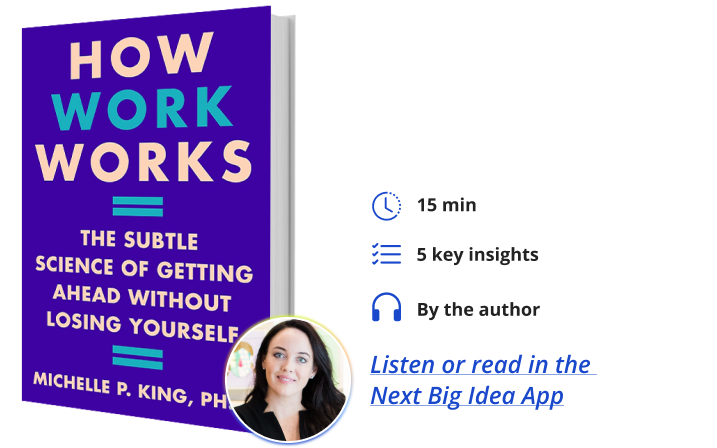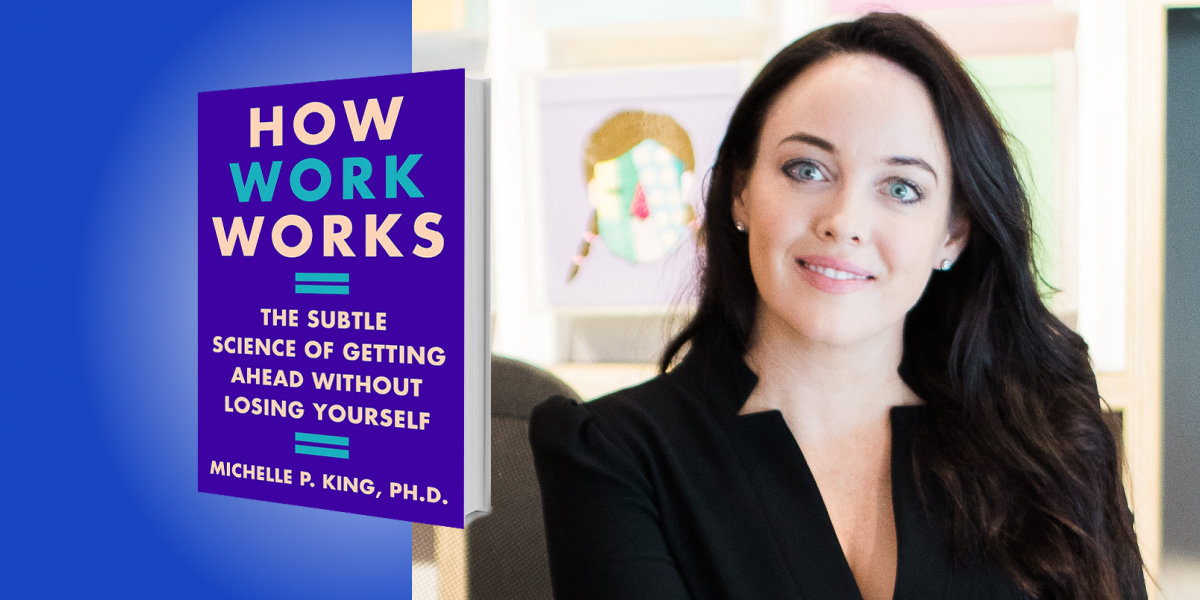Dr. Michelle King is a psychologist and business professional who hosts a popular podcast called The Fix. Her writing has been featured in publications such as The Economist, Harvard Business Review, Financial Times, and Bloomberg, and she has spoken at over 500 events worldwide, including the Nobel Peace Prize Conference. She regularly hosts keynotes, fireside chats, and masterclasses for companies such as Amazon, FIFA, JP Morgan, and FedEx. Michelle founded a global consultancy firm called The Culture Practice and is a Senior Advisor to the UN Foundation’s Girl Up Campaign, where she leads the NextGen Leadership Development Program. Previously, she was the Director of Inclusion at Netflix, as well as headed the UN Women’s Global Innovation Coalition for Change. In 2022, Michelle was named LinkedIn’s Top Voice for workplace equity.
Below, Michelle shares 5 key insights from her new book, How Work Works: The Subtle Science of Getting Ahead Without Losing Yourself. Listen to the audio version—read by Michelle herself—in the Next Big Idea App.

1. To succeed in the new normal, you need to master the informal.
A businessman in Kyoto was in a lunch meeting with his new client. After cordial exchanges, they got down to business. After a while, the client complimented the businessman’s watch. Proud and pleased, the man looked at his watch, smiling, marveling at the features of the fancy piece while retelling the story of buying it. The client’s face fell, unimpressed by the tale, and became disengaged in further business discussion. Wondering what he had said wrong, the man studied his watch again when he noted the time and realized their meeting had gone over the scheduled hour. He had missed the client’s subtle cue to wrap up the conversation.
The businessman shared his experience on Twitter, and the tweet went viral because his experience is something we can all relate to. Many of us struggle to manage the informal interactions of work. Managing how your work gets done is essential because most of us don’t just go to work and complete a list of tasks; we work with others to do our jobs. Collaboration is king. A 2017 Gartner survey found that 67 percent of organizations rank collaboration as the most critical workforce skill, and 82 percent of employees must work closely with others to do their job.
In the new world of work, we need to know how to interpret people’s feelings and intentions in order to manage informal interactions with them, whether that means sensing when a presentation has gone too long or understanding the subtext of what someone is saying. The new world of work is a hyper-social workplace because it requires one crucial skill: The ability to manage how you work with others. How we work enables what we achieve.
2. Informal networks are your career lifeline.
We are sold the idea that there is one type of network—a formal network—that we develop by attending after-work drinks or conferences and awkwardly introducing ourselves to random people so we can hand out a business card. This is the formal farce of working life because informal networking, which really impacts your career, doesn’t happen at formal events. Instead, informal networking occurs when we go for a coffee with a colleague or take a few minutes each morning to make small talk on Zoom with teammates. These small acts help nurture the connections we need at work.
“Nearly 70 percent of all jobs are not published or made publicly available.”
Every informal connection you make becomes a part of your informal network. Take a moment to write a list of anyone at work that you contact for either informal information, advice, or support. This list is your informal network. Nearly 70 percent of all jobs are not published or made publicly available, and consequently, 80 percent of vacant positions are filled through informal networks.
If you are a hiring manager struggling to hire diverse talent, it could be a sign that your informal networks are not diverse. A 2012 research study published in the MIT Sloan Management Review titled Cultivating an Inclusive Culture Through Personal Networks found that people with more diverse networks were more likely to be promoted and remain with their organization for a longer period and the diversity of their network-enabled them to solve problems more innovatively. Managing your network starts with diversifying it and cultivating relationships with people who may not look like you or share your background.
3. Close the self-awareness gap.
The Japanese businessman was not aware of how he was being perceived. He also didn’t understand his client’s needs because he wasn’t reading the informal cues correctly. He lacked self-awareness. For most people, a gap exists between how they see themselves and how others see them—what I refer to as the self-awareness gap. This gap exists because we are not objective. Self-ratings of performance are filtered through a biased self-perception.
Generally, research finds a lack of agreement between how we rate ourselves in terms of our behavior and performance and how others rate us. Specifically, a 2018 study by Harvard Business Review titled Working with People Who Aren’t Self-Aware finds that although 95 percent of people think they are self-aware, only about 15 percent are. We know that other people are not self-aware, as 99 percent of participants reported working with at least one person who isn’t self-aware. Most of us don’t believe we are that one person.
Cultivating self-awareness requires three ingredients. First, you must know who you are, which means being aware of your thoughts, feelings, and behaviors. This information helps you understand why you do what you do. Second, you need to know if how you see yourself matches how others see you. Third, you need to know how to adjust yourself to resolve any mismatch between how you see yourself and how others see you.
“Most of us don’t believe we are that one person.”
In most cases, by the time a person has a formal performance conversation, it is too late. They are in the meeting because they failed to understand how others perceive them. How others perceive you is often communicated informally, like an in-the-moment comment about your behavior on a project or a casual conversation with a colleague who suggests trying a different approach. We can also seek out informal information to understand how others perceive us. Friendly advice, feedback, suggestions, or guidance serve as a mirror to tell us how our colleagues are experiencing us.
When people are self-aware, they understand the self-awareness gap. They don’t solely rely on their own assessment but calibrate how they see themselves by including other people’s perspectives. As a result, self-aware people can identify what they need to do to close the gap.
4. Your potential to advance at work is determined by your ability to learn on the job.
Research finds that 75 percent of long-term job success depends on soft skills, and only 25 percent depends on technical capabilities. Additionally, employers rate soft skills as the most critical factor for entry-level success. Companies often sell the idea that an employee’s potential is determined by the skills they can list on a resume, but this isn’t true. Look at the way companies promote employees. Every year, managers discuss which employees have the potential to move to the next level. Leaders will debate people’s different skill sets to achieve consensus on the candidates for future leadership positions. What leaders are assessing isn’t the technical or universal skills an employee has; instead, it’s their ability to learn on the job. Companies in the United States spend around $160 billion yearly on formal learning programs, even though 75 percent of everything we learn is learned informally.
Your potential—your ability to learn—is determined by your intention to learn a new skill and your ability to take ownership of your development. Being intentional in one’s learning isn’t just about learning a new skill that didn’t exist a few years ago. Instead, it’s about looking for opportunities to connect, support, and learn from your teammates. When we learn informally, by observing people, obtaining informal feedback or trial and error, we take ownership of what we want to develop.
5. Success isn’t what we achieve, it’s what we leave behind.
In the old days, employees based job choices on a salary, role title, or hierarchical level—what academics refer to as objective career success. But our definition of career success has changed as careers have transitioned from the traditional career ladder to the protean career. No longer is a linear career path considered a measure of success. Our definition of career success has changed because our careers have.
The root word for success comes from the Latin exitus, which means to exit. Career success is the contribution we make—everything we leave behind. Meaningful work is the degree to which a person experiences their job as valuable beyond simply completing a task.
“People derive a sense of meaning at work through their connections to others.”
Meaning isn’t handed to us by our workplaces. It’s something we discover in learning how we work together. Despite the common myth that our salary should predict happiness, research finds that the quality of our relationships does. A 2015 review of over 1,336 academic journal articles found that other people matter most when it comes to our happiness. People derive a sense of meaning at work through their connections to others.
Most of us want more meaning at work—badly. A 2018 study by BetterUp surveyed 2,285 American professionals and found that 9 out of 10 employees, regardless of their job level, tasks, or salary, are willing to trade a percentage of their lifetime earnings for greater meaning at work. Moreover, participants were willing to forego 23 percent of their total future earnings (almost as much as people spend on housing) to have a meaningful job.
We are the communities we work in, which means we can create a meaningful experience by engaging in behaviors that support our community. A 2020 academic study published in the Journal of Theoretical Social Psychology finds that we enhance our commitment to our workplaces when we engage in behaviors that support our co-workers.
Your teammates will support you if they know you have their best interest in mind. When you pay it forward, your behaviors demonstrate that you are trustworthy, which activates the rule of reciprocity. Additionally, research finds that the more help a person receives at work, the more positive their overall behaviors are likely to be. The more help you receive, the more help you are likely to offer your teammates. When we help others, it decreases the likelihood our teammates will engage in negative behaviors, like harassing, discriminating, or excluding others.
Work is where we spend most of our waking hours. How we experience work is how we experience a considerable amount of our lives, which is why managing the meaning we derive from work is essential to overall life satisfaction.
To listen to the audio version read by author Michelle King, download the Next Big Idea App today:
































